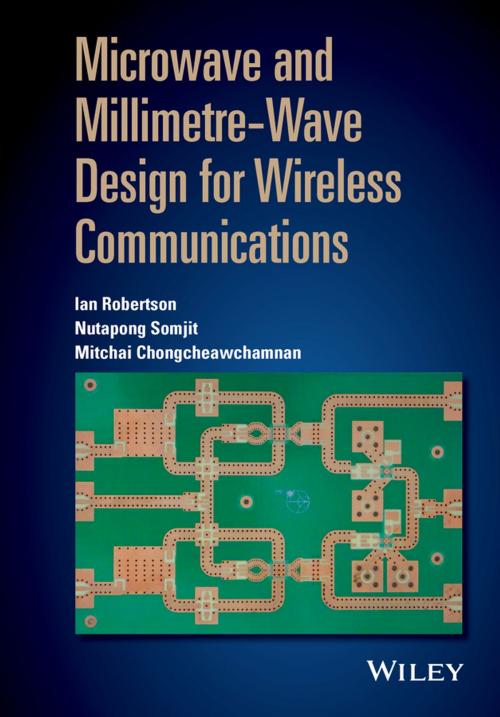Microwave and Millimetre-Wave Design for Wireless Communications
Nonfiction, Science & Nature, Technology, Microwaves| Author: | Ian Robertson, Nutapong Somjit, Mitchai Chongcheawchamnan | ISBN: | 9781118917305 |
| Publisher: | Wiley | Publication: | June 29, 2016 |
| Imprint: | Wiley | Language: | English |
| Author: | Ian Robertson, Nutapong Somjit, Mitchai Chongcheawchamnan |
| ISBN: | 9781118917305 |
| Publisher: | Wiley |
| Publication: | June 29, 2016 |
| Imprint: | Wiley |
| Language: | English |
This book describes a full range of contemporary techniques for the design of transmitters and receivers for communications systems operating in the range from 1 through to 300 GHz. In this frequency range there is a wide range of technologies that need to be employed, with silicon ICs at the core but, compared with other electronics systems, a much greater use of more specialist devices and components for high performance – for example, high Q-factor/low loss and good power efficiency. Many text books do, of course, cover these topics but what makes this book timely is the rapid adoption of millimetre-waves (frequencies from 30 to 300 GHz) for a wide range of consumer applications such as wireless high definition TV, “5G” Gigabit mobile internet systems and automotive radars. It has taken many years to develop low-cost technologies for suitable transmitters and receivers, so previously these frequencies have been employed only in expensive military and space applications. The book will cover these modern technologies, with the follow topics covered; transmitters and receivers, lumped element filters, tranmission lines and S-parameters, RF MEMS, RFICs and MMICs, and many others.
In addition, the book includes extensive line diagrams to illustrate circuit diagrams and block diagrams of systems, including diagrams and photographs showing how circuits are implemented practically. Furthermore, case studies are also included to explain the salient features of a range of important wireless communications systems. The book is accompanied with suitable design examples and exercises based on the Advanced Design System – the industry leading CAD tool for wireless design.
More importantly, the authors have been working with Keysight Technologies on a learning & teaching initiative which is designed to promote access to industry-standard EDA tools such as ADS. Through its University Educational Support Program, Keysight offers students the opportunity to request a student license, backed up with extensive classroom materials and support resources. This culminates with students having the chance to demonstrate their RF/MW design and measurement expertise through the Keysight RF & Microwave Industry-Ready Student Certification Program.
This book describes a full range of contemporary techniques for the design of transmitters and receivers for communications systems operating in the range from 1 through to 300 GHz. In this frequency range there is a wide range of technologies that need to be employed, with silicon ICs at the core but, compared with other electronics systems, a much greater use of more specialist devices and components for high performance – for example, high Q-factor/low loss and good power efficiency. Many text books do, of course, cover these topics but what makes this book timely is the rapid adoption of millimetre-waves (frequencies from 30 to 300 GHz) for a wide range of consumer applications such as wireless high definition TV, “5G” Gigabit mobile internet systems and automotive radars. It has taken many years to develop low-cost technologies for suitable transmitters and receivers, so previously these frequencies have been employed only in expensive military and space applications. The book will cover these modern technologies, with the follow topics covered; transmitters and receivers, lumped element filters, tranmission lines and S-parameters, RF MEMS, RFICs and MMICs, and many others.
In addition, the book includes extensive line diagrams to illustrate circuit diagrams and block diagrams of systems, including diagrams and photographs showing how circuits are implemented practically. Furthermore, case studies are also included to explain the salient features of a range of important wireless communications systems. The book is accompanied with suitable design examples and exercises based on the Advanced Design System – the industry leading CAD tool for wireless design.
More importantly, the authors have been working with Keysight Technologies on a learning & teaching initiative which is designed to promote access to industry-standard EDA tools such as ADS. Through its University Educational Support Program, Keysight offers students the opportunity to request a student license, backed up with extensive classroom materials and support resources. This culminates with students having the chance to demonstrate their RF/MW design and measurement expertise through the Keysight RF & Microwave Industry-Ready Student Certification Program.















